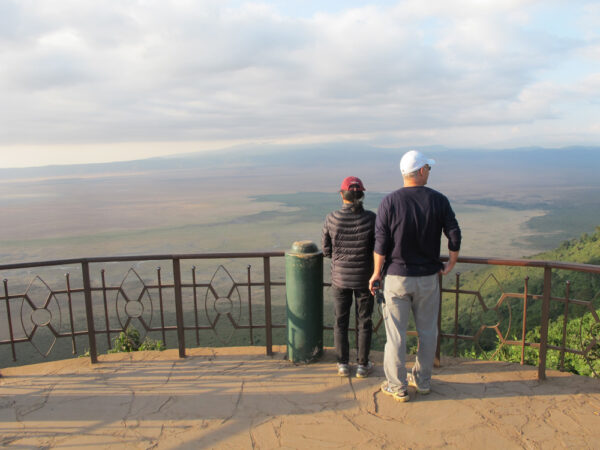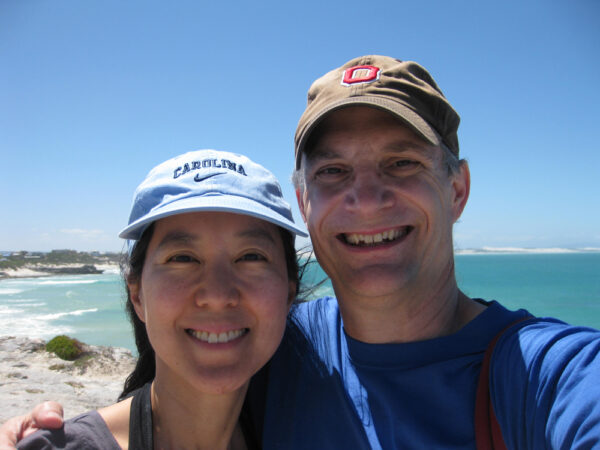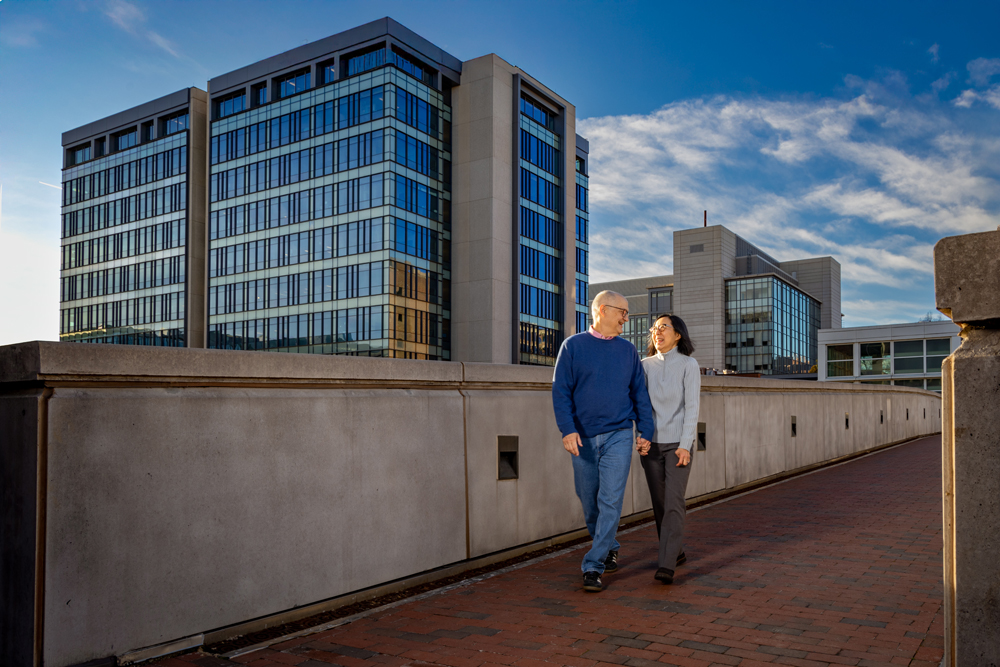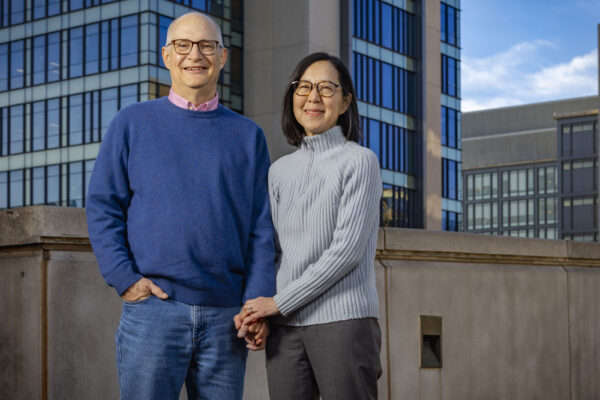When Bill Miller considers what drew him to his wife nearly 20 years ago, he looks at Clara Lee and smiles. She chuckles.
“She was attractive and very smart,” he says.
She laughs again.
Though the two focus on different research areas, they share a mutual mentorship.
“A challenge as a couple not working on the same research is that your deadlines may conflict with each other’s,” says Miller, a professor of epidemiology in the UNC Gillings School of Global Public Health. “Clara’s always been supportive during these times, even though her schedule is probably more crunched than mine now.”
“I really like being able to get Bill’s opinion on all kinds of things,” says Lee, a professor of surgery in the UNC School of Medicine and director of the Surgical Health Services Research Center. “We have desks right next to each other at home, and I’ll just lean over and ask him a question.”
Lee also admires Miller’s approach to balancing research and life — taking the work seriously but letting go of what you can’t control. They’ve had plenty of opportunities to practice this skill, going through two dual recruitments at universities in less than 10 years.
“It gave me insight into how strong our relationship was,” Lee says. “That was our greatest asset in the negotiating process.”
The two have settled back into their community at Carolina and continue to grow their research efforts. Lee is a surgeon scientist, specializing in breast reconstruction and studying how women make decisions about whether to have those surgeries. Miller is an epidemiologist and runs multiple clinical trials in Vietnam to prevent HIV spread and support people living with the disease.
Working in different schools and on different subjects, not all their colleagues know their relationship status.
“The funny thing for me has always been when people discover that we are married,” Lee says. “Or even better is when someone says, ‘You should talk to Bill Miller about that,’ and I’m like ‘Oh OK!’”
Little do these colleagues know that Miller and Lee first met in a Carolina classroom.
A classroom meet cute
In Fall 2005, Miller was teaching epidemiology and Lee was auditing his class as part of a School of Medicine (SOM) program for early career faculty. She had recently moved to Chapel Hill from San Francisco, where she did her medical residency in plastic and reconstructive surgery, and had lived in New York City before that as a general surgery resident.
“Moving to Chapel Hill was shocking,” Lee says. “It was a smaller town with relatively few Asian people. But I also instantly felt connected because of the intellectually rich environment, and just how nice and warm people were. I really felt like I fit in at the university.”
During her first year in SOM’s Clinical Research Curriculum, Lee was focused on developing her research skills. Miller, a seasoned researcher who had been at Carolina since 1997, was a faculty mentor in the program. And so, the pursuit of knowledge brought them together.
Miller became interested in Lee’s research, meeting with her to think through what questions she should ask to identify a specific area of concentration. Lee was interested in why some people get reconstructive breast surgery after a mastectomy, and some don’t. She wanted to know what happens in the decision-making process to affect these outcomes.
“Having someone who was interested in my work and saw potential was great,” Lee says. “I felt affirmed in my ideas.”
While Miller’s research focus differed from Lee’s, he knew the foundations of conducting solid investigations. In addition to his own studies on HIV and sexually transmitted infections in Malawi, Ukraine, and the U.S., he helped create the clinical research master’s program at Carolina, which connected medicine and public health.
“I had a lot of knowledge that was applicable to Clara’s area of study,” Miller says. “We met a couple times to discuss research, and then we realized we just liked talking to each other.”
A special connection
Their first official date was October 17, though Miller says they had several “non-date dates” before that.

Lee and Miller overlook the Ngorongoro Crater while on safari in Tanzania. The couple visited the country after a joint research trip to Malawi. (photo courtesy of Clara Lee & Bill Miller)
“Romance was on my radar,” he says. “I was divorced and had kids from my previous marriage. I was not actively looking for a partner but hoping.”
“He listened to me in a way that was thoughtful, encouraging, and positive,” Lee says. “That alone was helpful for my career. Plus, he was really cute.”
Their shared love of research turned into love for each other. As the months went by, they discussed moving their relationship to the next level, and Miller started looking for the right time and place to propose.
In 2007, Lee attended a summer research institute at Dartmouth College in New Hampshire. Miller traveled to visit her and brought along his 8- and 10-year-old kids — and an engagement ring.
“We went to a cozy country restaurant on the edge of a creek,” Lee recounts. “We were sitting on some big boulders in the water and the kids were nearby.”
“And I took advantage of the moment,” Miller adds.
They moved quickly from there, planning a small October wedding at Fearrington Village in Pittsboro.
“The outside ceremony was beautiful,” Miller recalls. “Our kids played piano, and it was lovely.”
“We included a statement of my intention toward the kids because I was becoming one of their parents,” Lee says. “The four of us hugged during the ceremony. It was sweet. The wedding felt like us.”
A new adventure
After the wedding, Miller and Lee got back into the routine of their work and life together. Lee continued her clinical practice and delved deeper into studies on how people make decisions to have certain kinds of surgery. Miller traveled around the world to maintain his clinical trials and continued teaching.
Time passed, milestones were met, and around 2015, the duo was ready for a new challenge.
“Leadership at The Ohio State University had been nudging me over the years to apply for the chair of the Division of Epidemiology in their College of Public Health,” Miller says. “Clara was open to pursuing opportunities elsewhere, so we decided to give it a try.”
But the plastic surgery department at Ohio State took a year to establish a role that fit Lee’s qualifications. During this time, UNC-Chapel Hill was actively working to retain Lee and Miller.
“The year waiting on Ohio State was really educational,” Lee says. “I learned a ton about myself, the academic recruitment process, and our relationship. It was really challenging, but we got through it together.”
In 2016 at Ohio State, Miller took up the position as division chair and Lee worked to build a reconstructive surgery practice and research program. They both grew in their roles and responsibilities — Miller became the senior associate dean for research in the College of Public Health and Lee led women’s academic advancement in the medical school and became vice chair of research in her department.
Then in 2020, the COVID pandemic began, launching Miller into an additional position.
“I worked on the university’s response and on a smaller level, the state’s,” Miller says. “That was incredibly hard. It became really challenging to do some of the research I wanted to do.”
Miller had never stopped collaborating with colleagues at Carolina. But his responsibilities and the stress of being a public health leader during a pandemic nearly forced him to stop his part in the clinical trials he helped establish.
“Bill continued to do the equivalent of more than full time with UNC on top of everything he did at Ohio State,” Lee says. “And then COVID became like a third job. He was working day and night pretty much every day during the pandemic.”
Eventually, Lee hit a turning point of her own. Though she had stretched her legs as a leader and advanced her research, things didn’t feel quite right.
“I found it challenging to do my research at Ohio State,” she says. “I felt like it wasn’t the place for us.”
“It never felt like home,” Bill says.
A return to Carolina
In 2023, Lee was recruited back to the UNC School of Medicine by Caprice Greenberg, the chair of the Department of Surgery, to lead the Surgical Health Services Research Center. The couple knew it was their chance to return to the community they loved and missed.
By this time, Miller had resigned from his administration positions at Ohio State to focus on research — the pursuit that gives him the most joy. Returning to Carolina, he took a research track professor position in Gillings to continue his studies.

Lee and Miller visited Arniston, South Africa, during a research trip there. (photo courtesy of Clara Lee & Bill Miller)
Miller’s current research focuses on people who use drugs or alcohol, helping them limit their risk of HIV or manage their infection if they already have the disease. Through the UNC Institute for Global Health and Infectious Diseases, he and Gillings’ Vivian Go are leading five clinical trials in Vietnam, testing a range of HIV-related health areas from the effect of counseling sessions on medication adherence to investigational drugs to interventions for excessive drinking.
Having grown her career at Ohio State, Lee required many resources as a surgeon scientist, which took time for the School of Medicine to secure.
“But UNC knows how to recruit senior faculty and couples, and they know how to advance the careers of clinician scientists,” Lee says. “Those are things I thought all good universities do, but they do not.”
Lee is now working on three main projects — disseminating decision aids for breast reconstruction surgery through social media and online communities, adapting a decision aid for Spanish-speaking Latina breast cancer survivors, and improving how researchers share medical information and study details with clinical trial participants.
Lee and Miller are happy to be back at Carolina, which has become even more special for them after exploring other opportunities. While one could say absence makes the heart grow fonder, a scientist might say collecting additional data allows an investigator to better understand a phenomenon. And the data pointed to UNC-Chapel Hill.
“The value of clinician scientists here and the culture and infrastructure that exists around them are really high quality and a signature of Carolina,” Lee says. “I appreciate that the university just does it and doesn’t make a big deal about it. We just do a good job and let the work speak for itself.”



